'If the blatant criminal act of destroying a place of worship is to be rewarded by giving the whole land to those who committed that act, then it raises lots of questions.'
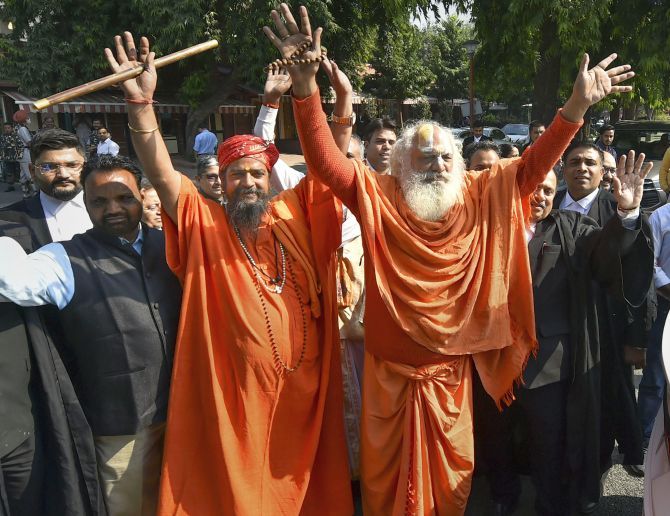
Dr Madhav Godbole resigned as Union home secretary after the Babri Masjid demolition in 1992 and subsequently took voluntary retirement after 33 years as an IAS officer.
The author of over 16 books, his recent book The Babri Masjid-Ram Mandir Dilemma -- An Acid Test For India's Constitution was published two months ago.
"Wherever in an act of communal violence any place of worship of any religion is damaged or destroyed it must be rectified and repaired by the government at its own cost. That is the only way you can give a sense of confidence to the minorities and affected communities that there is a government which will protect your rights," Dr Godbole tells Rediff.com's Archana Masih in the first part of a two-part interview.
What did you think of the judgment?
A long, overdue, judgment has finally come and put an end to a very long standing, highly emotive communal issue.
In that sense, it is to be welcomed.
At least there is no further access to courts since the judgment has come from the highest court in the land.
Was the unanimous verdict something you expected or did it take you by surprise?
Quite frankly, I was a little surprised though it was a unanimous decision of five judges. I thought the secularism part of the Constitution did not receive fair treatment.
The Supreme Court particularly accepted two issues that the placement of idols clandestinely inside the Babri Masjid was wrong, and that the demolition of the mosque was a criminal act.
There was no need to reiterate this, but they have to carry the conviction to people.
Once you say that, then the question of the secular precepts come into prominence all the more. Then whether the minorities received a proper treatment for their place of worship or not is something that will bother anybody.
The place of worship of any religion must be respected. Whatever historical wrongs there maybe -- to rectify them by demolishing somebody's place of worship is not an answer.
Therefore, some kind of rectificatory action would have been welcomed, but the court has given an alternate site of 5 acres to the Muslims.
To my mind that does not go far enough.
What could this rectificatory action have been because those who demolished the mosque have not been punished and that case is still going on in a Lucknow court?
Unfortunately, there is very little that the Supreme Court could have done at this stage so far as the criminal case is concerned.
I have written and talked about it that it is a shocking state of affairs that for 27 years no one has been held responsible.
The criminal case had more or less been wrapped up, but it was only at the intervention of the Supreme Court that the case was revived. The Supreme Court had asked the Lucknow court to decide the case on the basis of day to day hearing which has been going on.
There were reports that the concerned judge hearing the case was due to retire, but has been given an extension for 2-3 months till the case is decided.
At last that decision of the court will be available in 2-3 months, but the legal system being what it is, that will only be the first decision in the case. Thereafter, the appeal process to the high court and Supreme Court will begin. I am sure it will take several years.
The verdict referred to the term 'secular' many times. What does the verdict signify for the future of secularism in India?
You have raised a very important question.
Unfortunately, there is no definition of 'secular' in the Indian Constitution. When the Constitution was drafted such an effort was made, but it did not succeed.
Then an effort was made in 1976 when this word was included in the preface to the Constitution for the first time.
Even at that time effort was made to define that word, but it did not succeed.
Thereafter, there have been discussions about this subject, but they have not been successful.
In fact some judges of the Supreme Court themselves, including (then) Chief Justice (A M) Ahmadi, was of the view that it is best that this term was not defined so that it can be interpreted in a flexible manner.
There are different views on this subject, but it is a fact that the term has not been defined and according to me that is a major lacuna.
I have written in my books and recent book on the Babri Masjid that if secularism is to be operationalised and brought into practice and become a reality, then it must have a definition.
Unless there is a definition, how can you go to a court of law or any other institution and say my fundamental right to secularism has been violated?
Much remains to be done in the area of operationalisation of secularism and bringing secularism into reality.
Some of these issues arising from the judgment will have to be debated and necessary corrective action taken.
What are the other issues arising from this verdict that need to be debated?
Another issue that needs to be debated is how to deal with communalism.
If the blatant criminal act of destroying a place of worship is to be rewarded by giving the whole land to those who committed that act, then it raises lots of questions.
The fact is that this decision could have come in 1993.
The Narasimha Rao government made a reference at that time to the Supreme Court to ask for advisory opinion under Article 143 of the Constitution whether there was a temple or any other construction underneath the mosque.
The idea was that if it was so, then a particular decision would be taken and if it was not, then another decision could have been taken.
This case was argued in the Supreme Court for a year-and-a-half and I think in October 1994 the court gave a judgment that they will not respond or reply to the request of the President of India for advice and let this matter be decided by the court in due course.
But this very point -- whether there was a temple or construction under the Babri Masjid -- is the issue on which the Supreme Court has relied on it now and referred to the ASI report etc. They could have said the same thing in 1993 and 25 years could have been saved.
Thirdly, under the Constitution, a large number of such issues come under the purview of the states.
The central government can't do anything in the matter, but as a country we must have a national policy on these matters like minority concerns, communalism, communal harmony.
States must act within that national framework. There is no desire as yet to address these issues because of wrongly placed concerns of the states for their own rights and federalism.
The disputed land has been given to build a temple. How do you think it will impact the Muslim community?
One of the actions I am suggesting is that the Supreme Court itself should have ordered that the mosque will be rebuilt by the government.
Let the state government and the Government of India together rebuild the mosque. That was the commitment that then prime minister Narasimha Rao gave Parliament and outside.
He said we will rebuild the mosque.
Now the Supreme Court has given the decision that a piece of land must be given, then this is the time that the mosque should be rebuilt by the Government of India.
I go a step further and in my book on the Babri Masjid propose that wherever in an act of communal violence any place of worship of any religion is damaged or destroyed it must be rectified and repaired by the government at its cost.
That is the only way you can give a sense of confidence to the minorities and affected communities that there is a government which will protect your rights.
There are other concerns which will come out when you read the judgment, these are preliminary concerns.
There will be issues that will come up in discussions and debates in parliament, media in days to come.
- Part II: 'India of 2019 is not India of 1992'
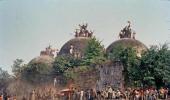
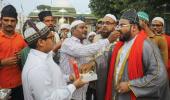
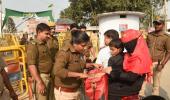

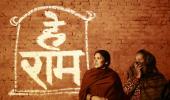






 © 2025
© 2025